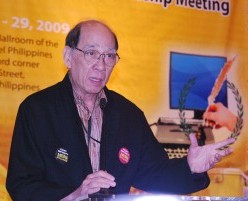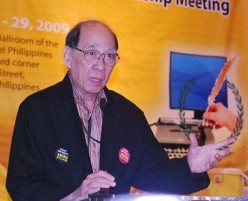Jose Pavia, a veteran journalist and tireless press freedom advocate, died on April 18 in the Philippines. Pavia, known simply as “JLP” among his friends and journalist colleagues, was a key partner in CPJ’s Global Campaign Against Impunity. He was 72 and had been battling cancer.
Obituaries in the local press highlighted how Pavia’s career tracked the ups and downs of Philippine politics and journalism. Pavia, like many other journalists during the post-1972 martial law period of the regime of Ferdinand Marcos, was fired under political pressure. At the time, he was assistant editor at the Philippine Herald.
Ben Cal, a colleague when Pavia headed the official Philippine News Agency and now a reporter with the Philippine Daily Inquirer, noted how Pavia often managed to “wiggle out from the glaring eyes of military censors” so that the official wire service had “a semblance of ‘independence’ during those trying times.”

Pavia was among a generation of Filipino journalists who, after the fall of Marcos and restoration of democracy in 1986, fought strenuously to ensure that the local press was never again co-opted and repressed by a heavy-handed government. Though that fight continues, it has contributed to one of Asia’s most vibrant civil societies.
I first met Pavia at the launch of CPJ’s Global Campaign Against Impunity in Manila in November 2007. Like many Filipino journalists who recall viscerally the intimidation and abuse of the Marcos era, Pavia spoke with frustration about the high number of media killings and the lack of justice that has now spanned five successive ostensibly democratic administrations.
Pavia fought, literally to his dying day, to reverse that trend. His leadership role with the Freedom Fund for Filipino Journalists (FFFJ), an important CPJ partner in the network of Philippines press groups, contributed to the creation of rapid response “tracker teams” deployed to independently investigate media murders–in which too often the police themselves are suspects. His advice also helped guide CPJ’s 2009 research into the crucial role of witnesses in Philippine trials (where there is seldom any forensic evidence to go on and witness testimony is crucial to a successful prosecution) and the need for better witness protection in combating impunity.
Pavia’s death follows that of Leo Dacera, who as a senior state prosecutor worked to bring to justice those accused of the murders of journalists in the Philippines.
As a senior statesman among the Filipino press corps, Pavia’s voice had important resonance both inside and outside government. And as the Global Campaign Against Impunity moves ahead, it’s a voice for reform and justice that will be sorely missed in the Philippines.
